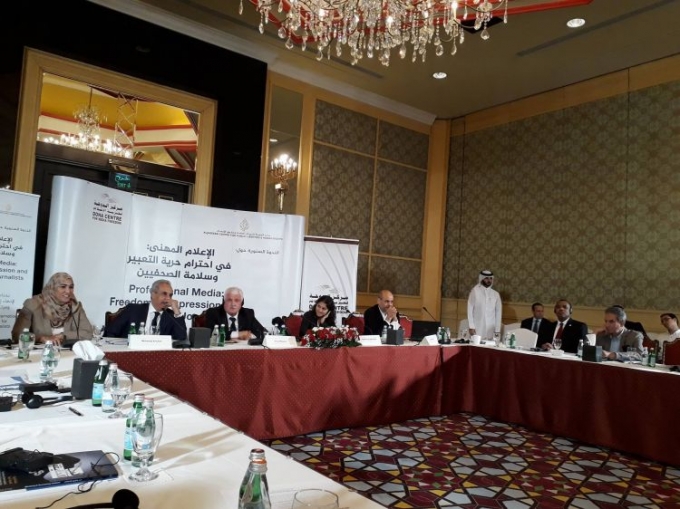Dear participants, colleagues and friends!
Today, I would like to talk about the difficulties faced by professional media in reflecting political and humanitarian crises and armed conflicts. The world is burning on the fire. There are over 50 conflict zones in the world. Almost all of the war zones are closed for the professional journalism. Every day, together with the colleagues, we experience dangerous exercises in the conflict zones like killing, stealing, terrorizing. When all of this will end? What is the reason for this? The war zones have their own laws. Those laws are formed in the conflict by the stakeholders and superpowers. Here, I want to remind about the collapse of the Soviet Union, which I have witnessed in the late 80s and early 90s years. The collapse of the world's largest empire was accompanied with the appearance of numerous ethnic conflicts on the post Soviet space. At that time there were the conflicts in the Caucasus, in the Baltic states and Central Asia etc. With regard to all of these conflicts, the Soviet leadership created an information vacuum. All of the information were passing through the Kremlin filter and did not reflect the truth. Leonid Lazarevich, Valeriy Dementyev, Ali Mustafayev, Fakhraddin Shahbazov and other journalists who wanted to reflect the truth and cover the reality of the conflicts in their materials became the first victims of the conflict. The first female journalist who was killed during the Karabakh conflict, Salatin Asgarova is still in our memories. There after Sintia Elbaum, Victor Popkov in Chechnya, Georgi Chania in Abkhazia, Kazim Agaev, Chingiz Mustafayev died while performing their professional activities in Karabakh. Later on, the names of hundreds of journalists who used to cover the conflicts in the Post-Soviet space were added to this list.
Until recently, the protection of journalists was insured under the Article 49 of Geneva Convention “Journalists who carry out their activities in the armed conflict zones, must be considered as civil population”. At this time international law and norms, applied to civil population, also relate to journalists. The UN resolution, accepted by the General Assembly on November 2 in 2013, “The Security of Journalists and Impunity Issues” is a very important document for ensuring the security of journalists. However, this document is still not enough to resolve the core of the problems.
We remember 2016 with negative experience for journalists safety protection. 77 journalists lost their lives being on their missions. 30 percent of these crimes against journalists have not been disclosed yet. Generally, during the past 10 years, more than 1000 journalists were killed being on their missions.
Number of existing and frozen conflicts all around the world, the crimes happening on the uncontrolled territories occupied by mercenaries, unrecognized principles of the international law, existing problems in the protection of the supreme law, dissemination of non-objective information, violation of the basic principles of journalism are the main obstacles in the process aimed to guarantee the protection of journalism. Together with civil society, the unanimous decision of the governments on the issues about the security of journalists and the elimination of impunity are very crucial. Moreover, the strengthening implementation of the adopted general prinsiples about journalism, opening special corridors on the terretories where there are the conflicts and providing the professional trainings for journalists to cover the humanitarian crisis and conflicts should be considered very seriously.
The real practice makes it clear that fundamental values of human rights in the conditions of war replace its position with the norms and rules of the international humanitarian law. This fakt postpones the general prinsiples of the journalism protection to the second stage. However, I thing that protection of journalists rights and promotion of freedom of speach in conflict affected teretories are very important. In my opinion, protection of journalists in accordance with the international norms during the conflicts and dissemination of the objective information from the conflicts zones are crucial for establishing an unified position of international community required for settlement of the conflicts.
Azerbaijan, which I am representing, is also a country that suffering from the war. Since the beginning of the 90s when the Karabakh war resulted in occupation of the 20 percent of Azerbaijani territory, nine journalists engaged in their professional activity in the conflict zone were killed. However, international community has not accused those who continue the occupation and blodsheed actions nor with the juridical or political.
Dear friends, my dear colleagues!
Although more than 20 years have passed, the scenario has not changed yet. The threats to the professional duties of journalists, their arrest and killing are the most painful side of the world media. In this regard, we highly appreciate the action conducting by Al Jazeera in mobilizing the international community to protect journalists.
Frankly saying, reportages and articles about separatists’ calls aimed to intensify armed conflicts, artificial aggravation of the situation in the Arab countries and in many other places of the world serve in special and corporative interests and used to flame up the confrontations.
I appeal to all media professionals to be realistic, more responsible, sensitive and impartial in spreading the objective information. In my opinion, fundamental freedoms and protection of human rights should be the main strategic milestone in the period of crisis without any distinction. The concept of truth should be in the centre of this milestone. In this case each media organization has to demonstrate solidarity and uncompromise position in the protection of journalists' rights, provision of safety and freedom of expression.
Thank you for your attention!


